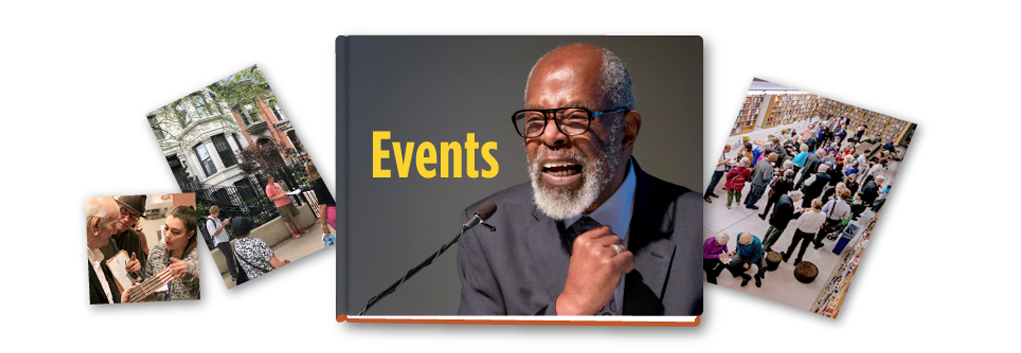An Interview with Author and Hostess Rita Dragonette
Thursday, February 15, 2024
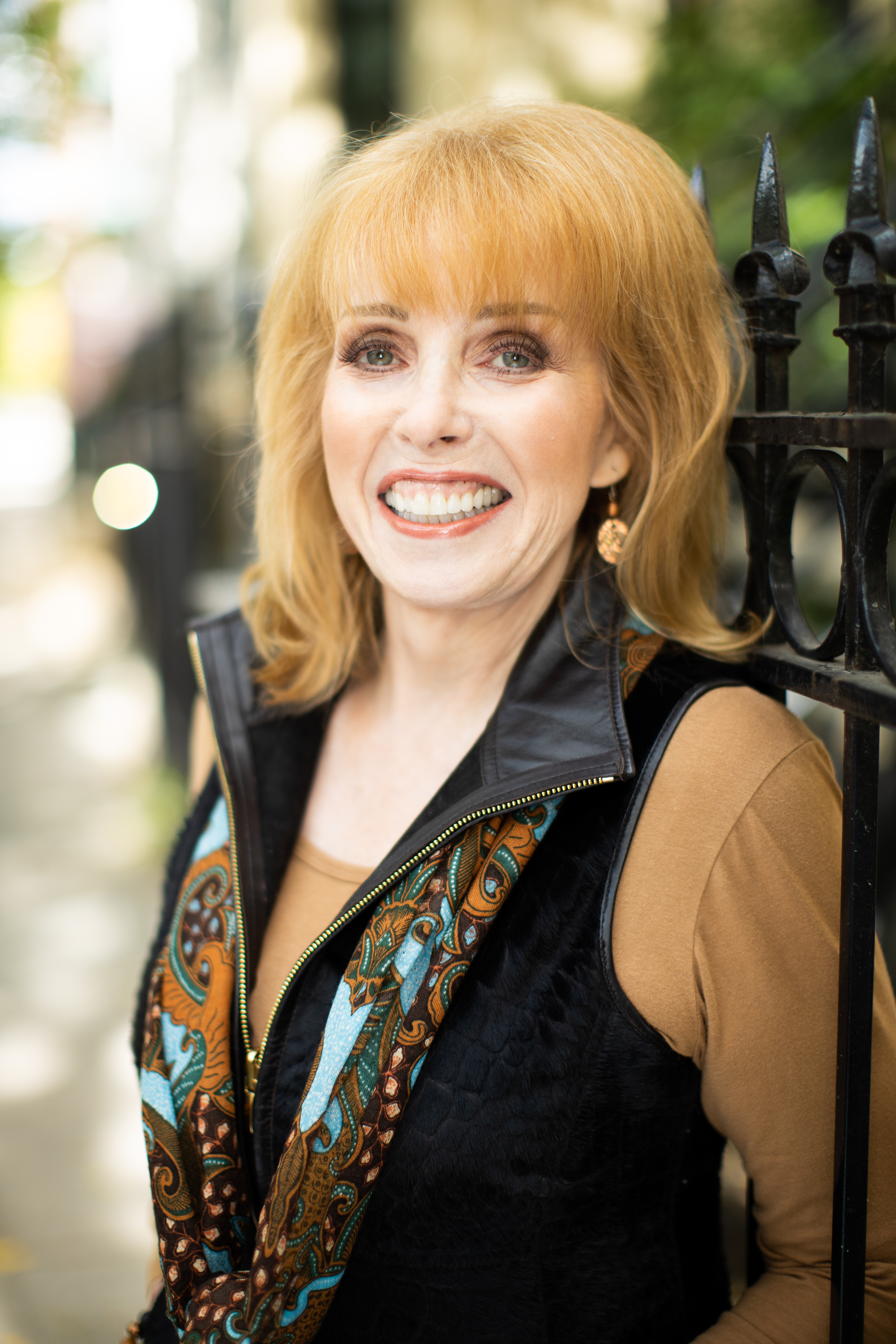
When I arrived at Rita Dragonette’s North Lake Shore Drive condominium last February, I found her anxious. The Chicago Literary Hall of Fame’s first in-person cocktail fundraiser started in an hour, and in total about 40 people were expected. I’d known Rita about five years. She’s a warm, wry confident woman. She easily joins conversations, even with strangers, and habitually makes friends along the way. We see each other fairly often, in part because we’re both frequent guests at readings throughout the city. It was my first time at her home. Rita’s condo is spacious and tasteful, decorated, in part, with artwork gifted or made by friends. Karen Thompson photographs hang throughout the living area, while big Ken Probst paintings adorn the adjacent condo, which Rita owns and uses as an office. The centerpiece is a photograph of a painting, a sort of dark fantasy forest scene. The condo’s green, blue, copper and salmon tones match that painting.
Rita’s desire to make this evening perfect was what no doubt had her a bit out of sorts. More than the ideal number of people were coming, the food hadn’t yet arrived, and there was furniture to be rearranged. She knew, much better than I did, how to make an elegant Chicago literary party work.
Rita grew up in Palatine, but has lived in Chicago proper ever since her graduation from Northern Illinois University. Like a lot of us, she moved around when she was younger, living in Rogers Park, the Rush Street area, Old Town, the Loop, and at one point in the E.E. Cummings building of the Sandburg Village. She’d been in her North Lake Shore Drive place more than 20 years. Those who think New York’s social sophistication outranks Chicago have never met the Rita Dragonettes of our city. Rita hosts an annual holiday party, frequently has people over for salons and other literary events, and in general throws grand parties. The author of a very well-received historical novel, Rita serves as a magnet for interesting, artistic, kind people.
Of course, Rita’s nerves subsided as people arrived. The party turned out better than expected, and we had expected a lot. Much of that had to do with Rita’s granular attention to the details—things I didn’t think of or notice, especially after my first glass or two of red wine. Rita’s novel is like that, too—all the little exact moments, over the course of the story, add to our greater sense of the setting and situation.
In the final tally, a great party is a shared experience that brings people closer. Rita excels at creating the conditions for that. As we approach our next cocktail party fundraiser, we’re lucky to have Rita as part of our planning team.
DGE: We met at Kelly Morgan’s house in Evanston late in 2018—she had been kind enough to throw a book party when my story collection, An Off-White Christmas, came out. At the same time, you’d just published your debut novel, The Fourteenth of September.
RD: I had met Kelly at Ragdale. She contacted me and said you were doing a launch. She wanted me to join the party. So we had that delightful double reading in her living room.
DGE: That was my introduction to you and your work. Tell me a bit about your path to putting out that first major work.
RD: It was a story that had been brewing since college. There wasn’t enough money to go for my dream of being an English Major, so I had to go for the job. By the time high school was over I had only enough money from babysitting and working at the Park District for one year of college. My mom had been a nurse during World War II and at the time worked at the Nike site in Arlington Heights. One day she can home with a pamphlet about a full- ticket military scholarship for nursing. I reluctantly submitted and was awarded the scholarship based upon my essay “From the Frog Onward,” about dissecting a frog. So ironically, it was my writing skills that allowed me to get into school to become something I didn’t want to be. I ended up on campus during the tumultuous times of the first Vietnam Draft Lottery and Kent State. I lived and witnessed things I knew had to be recorded. I got a letter from a friend telling me there was a story in those years and I was the one to tell it. Many years later, long after I’d switched career tracks, I finally was in a place in my life where it was time and I used what I had experienced as the basis for the novel—a woman’s story of Vietnam.
DGE: Did your interest in literature start early?
RD: My mother was the epitome of a voracious reader, and it was logical to think “wow,” whatever it is she’s doing must be fun and I want to do it, too. She’d pick out these great books for me when I was sick and introduced me to the library the minute I was old enough for a card. I took to it like glue: I loved stories and was a huge daydreamer, always imagining a character of my age inserted into the stories I read or movies I saw, spinning out new subplots I would “star” in. I particularly loved historical fiction. I could experience anything anywhere in the world at any point in time. What could be better? At the same time, I was a shy child, more articulate in communicating via writing. I was praised for it, and it was fun-- a comfortable way for me to engage with the world. It was also challenging—both intimidating and inspiring. I thought writing was the hardest thing to do, and therefore represented the greatest achievement possible. So to me the life of an author must be the most interesting possible.
DGE: You had a successful career in public relations and marketing, then a second act as a career counselor. When did the time come for you to realize those early dreams?
RD: When I sold my Public Relations and Marketing agency after 25 years in the business, I thought, “I will write this book, and finally be an author.” I took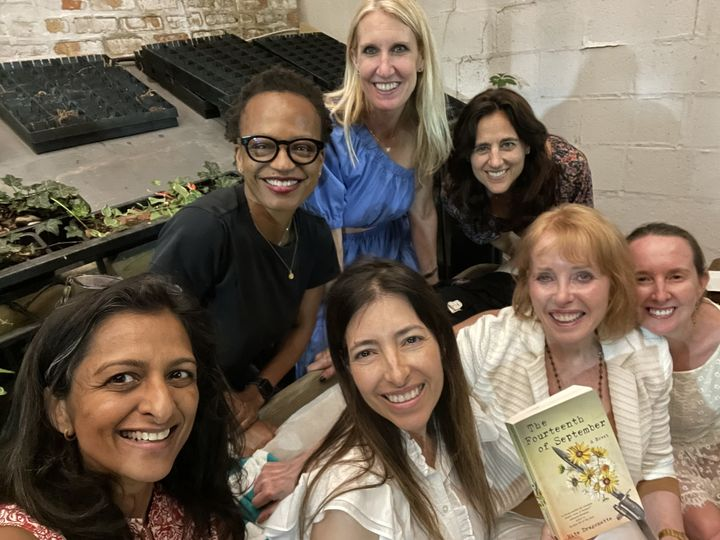 some open classes at the [University of Chicago] Graham School, and one of my writing instructors, Gary Wilson, suggested I apply for their new Certificate in Creative Writing. I started drafting my novel during that time. It was a two-year program, and my certificate was “with a concentration in the novel.” That was the spring of 2008.
some open classes at the [University of Chicago] Graham School, and one of my writing instructors, Gary Wilson, suggested I apply for their new Certificate in Creative Writing. I started drafting my novel during that time. It was a two-year program, and my certificate was “with a concentration in the novel.” That was the spring of 2008.
DGE: It’s an historical novel set in the Vietnam era. The timeline parallels your own, in that you were around the age of these characters during this story. How did you strike the balance between memory and creation?
RD: This was above all the most difficult challenge. Though the story is based on a lot of experiences I’ve had, it’s highly fictionalized. Actually finding the plot among all my memories was difficult. My first drafts were terrible because I felt like I had to write scenes exactly as they happened. But real life doesn’t present itself as a narrative arc with great pacing. It was really hard to let go of reality. In my second residency at Ragdale, I remember something lifting in me. I put my characters in circumstances that were much more dramatic than what really happened. I started changing traits of characters based on people I knew, inventing new ones. I thought, “Now I’m doing fiction.” The story now was based on things that had happened rather than a recounting of what had happened. It was a huge breakthrough.
DGE: The draft lottery creates a central tension in the novel. For me, the story made me think about luck. On the surface, the fate of these characters seems random, but there are all these exterior forces stacking the deck. What ideas were you trying to explore?
RD: Fate and chance were key. I was fascinated by how the draft lottery echoed the Shirley Jackson story, “The Lottery.” I remembered at the time joking that I wanted to accuse the government of plagiarism. There was no reason for what happened in that story or why a victim was “chosen.” We felt the same—by the timeframe of the story, no one could offer a believable reason for why the war was being fought, and draftees were chosen based upon their birthdates put in little blue balls and spun in a container like on a game show.
I was equally interested in the fact that we were all just teenagers--children, isolated on a campus. A phone call home was very expensive. We didn’t read newspapers. Here we were in this rarefied environment, and the outside world was coming to pick us off, one by one. And then came Kent State and the government was willing to shoot us. We truly felt this was as bizarre as Twilight Zone. We simply did not have the life experience to balance issues like, Am I ready I lose my virginity to my boyfriend one day” and, and “Oh, my God, the guy next to me in study hall just got his draft notice and could be dead by Thursday.” You’re in college and learning who you are, but you have to deal with war. No wonder some of the decision made and actions taken were crazy.
I didn’t think the home front issues of the kids affected by this had been sufficiently told. And certainly not from a woman’s point of view. We had to experience it all with the standing to be taken seriously. “Why would we listen to you? You won’t be on the firing line?” Franky, I waited so long to write this story, I couldn’t believe it hadn’t yet been told. And now Kristen Hannah has just come out with The Women. I’m anxious to hear what she has to say.
DGE: You’ve been at work on a second novel. Is it finished? What is it called?
RD: I’d say it’s in final edits. I’ve been working on it since the last book, on and off; it’s in the fifth version of a manuscript. I’m hoping it’s close. It’s called, Last Sunset in San Miguel. It’s an homage, or echo to, The Sun Also Rises: Disenchanted boomers off to the new expat capital of the world with their last dreams, the ones that really must come true.
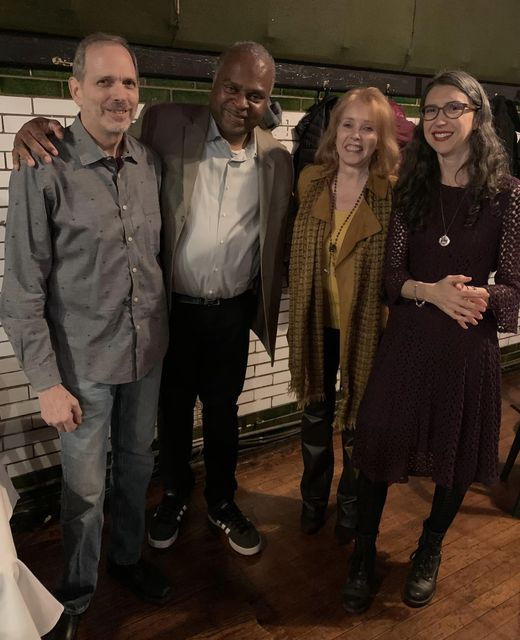
DGE: As we became friends, I soon realized you had tentacles all around Chicago’s literary community. You’re a joiner, an organizer, and a supporter. I know you’re a part of several writing communities. You mentioned Ragdale. Just before the pandemic cancelled all live programming, you were set to host a CLHOF book club and dinner with Kathleen Rooney. What are some of the ways you get involved, and why?
RD: Writing wasn’t the first thing I did out of college; it’s like my third career. I knew what it took to be successful in those careers and, having been a career consultant, I knew I didn’t have unlimited time to practice my craft –no ten unpublished manuscripts in a desk in my garret. The way to accelerate all that was to get involved in community. I went to Ragdale ten times and wrote most of the novel there. Patty McNair [an instructor at the time at Columbia College] invited me to join Our Chapter, a group of women writers in Chicago. I also got more involved in Ragdale, including financial support. When I learned about the Chicago Writers Association, I thought, “I should be a member of that.” When I learned about Women’s Fiction Writers Association, I thought, “I should be a member of that.” They have such amazing resources for writers. know how to network from the business world and just applied the same skills.
I’m really proud of the fact that I’m in Chicago with this heritage of great writers. I wanted to get out there and learn more about it and contribute to it. I met people like I met you--somebody put us together. Through you, I learned about the Chicago Literary Hall of Fame. Every mentor I have had, I met through one of these organizations: the University of Chicago, the Chicago Writers Association, Ragdale, Chicago Literary Hall of Fame, StoryStudio.
DGE: You often host parties, or salons, or get-togethers by another name. What drives you to bring people together?
RD: I’ve benefitted so much from this community; I wanted to give back, and I’m in a position where I have resources to offer. My literary salons began when a friend of mine was a screenwriter who’d written a book. She’d published a novel but didn’t know where to go after that. I got together a group of people. She talked about her book, and its social themes, and we had a such a fabulous, intimate discussion. I did 10 or 15 of those--once a quarter, until covid. It was a good way to expose people that didn’t have a network to other people who were avid readers. In much the same way, last year’s CLHOF cocktail fundraiser spurred all kinds of other conversations than what we thought there would be.
DGE: You hosted last year’s party, which we called The House on Margarita Street. The title was a play on the Sandra Cisneros book. You have such a lovely home and are an incredibly gracious host. You were instrumental in making that party a success. You’re also heavily involved in making this year’s party work. Do you enjoy this?
RD: I think it combines the two halves of my life. Writing can be ever so solitary. I’m an extrovert. I spent 25 or 30 years in public relations--interacting with the public, talking before people and doing events. I don’t shy away from marketing; I don’t hate it. Being able to do that and entertain people interested in literature--I can offer them good food, drink, a comfortable home--that’s the best kind of a good time.
DGE: It’s a lot of work to make sure other people have a great experience, isn’t it?
RD: I’m somebody who likes to entertain that can’t cook. When I grew up, my mother didn’t like to cook, and it didn’t look like any fun. So I can’t do dinner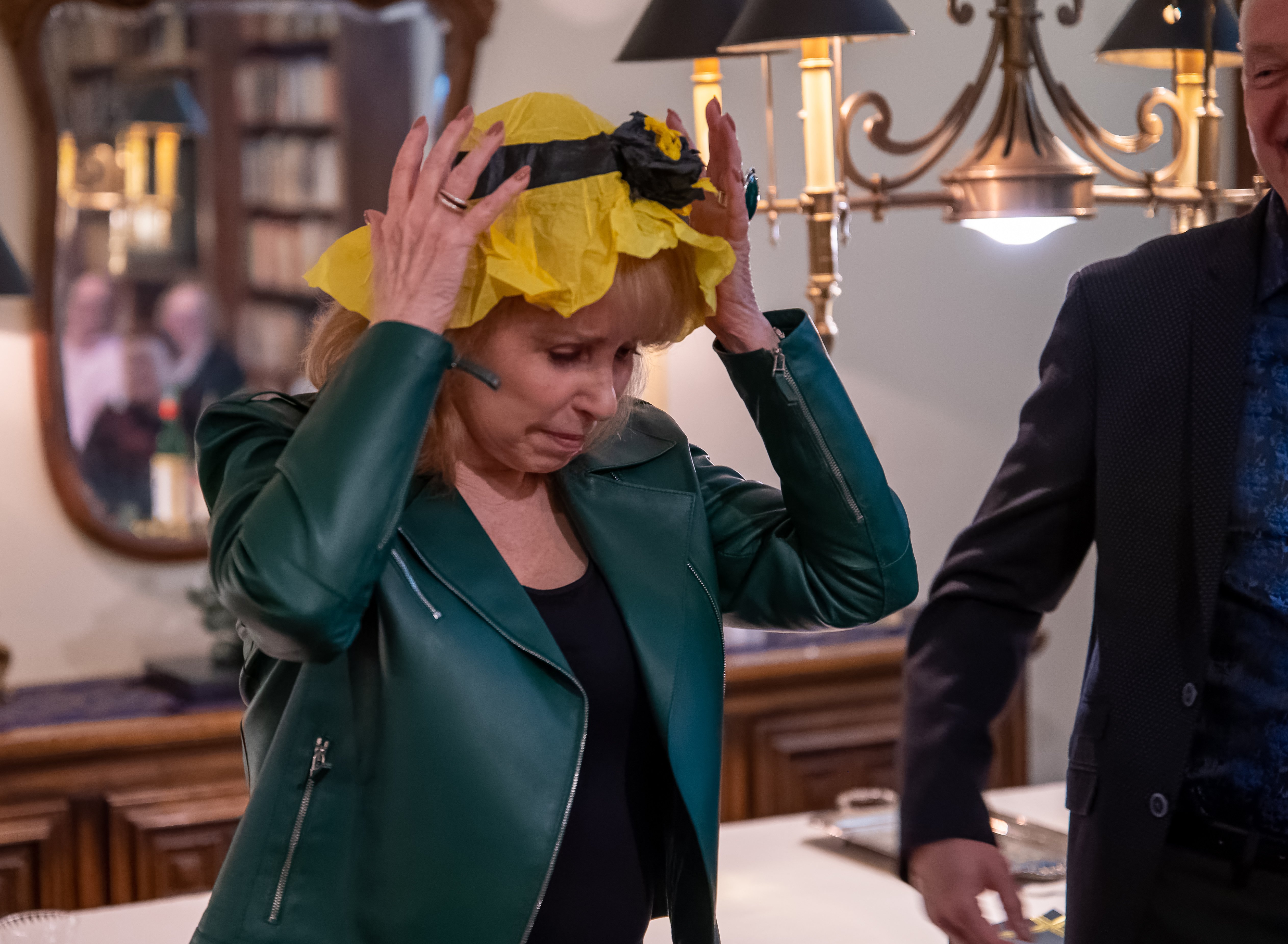 parties. I’m the guest that brings dessert from a bakery. I like to entertain when caterers are involved.
parties. I’m the guest that brings dessert from a bakery. I like to entertain when caterers are involved.
DGE: The Great Gimlet will incorporate so many elements I love: great venue, thoughtful menu, creative drinks, literary history, lots of great people and conversation….
RD: I’m really excited. Last year surprised us all—it was the first live party after you introduced the concept over Zoom, and there was so much energy and enthusiasm. Ryan is this wealth of information. We had magic tricks. Last year, somebody said it was like going to a New York salon—there were so many interesting and accomplished people. We were giddy. Now we can do it in a bigger space and have more people. The fact that we’re doing it in the 1920s is a gas. The Great Gatsby is the ultimate Jazz Age book. It brings up costume ideas that go from silly to ridiculous. And we’re going to do it in a speakeasy? I’m looking forward to helping hostess; this year will be off the charts.
Donald G. Evans is the author of a novel and story collection, as well as the editor of two anthologies of Chicago literature, most recently Wherever I’m At: An Anthology of Chicago Poetry. He is the Founding Executive Director of the Chicago Literary Hall of Fame, which will host its fourth annual fundraising cocktail party on Saturday, Feb. 4 at Colvin House (5940 N. Sheridan Road, Chicago), starting at seven p.m. The theme of this year’s party is The Great Gimlet, and scholar Michelle Moore will enlighten us with details about the relationship between Chicago and The Great Gatsby. Mixologist Ryan Prindle will make signature Chicago literary cocktails, including a French 75, a Gimlet, and a Sazerac. Registration is now open. We’ll close registration as soon as we reach our capacity, so don’t delay.


